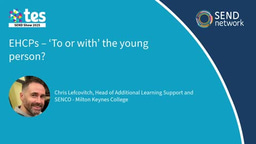SENCOs under siege

The full extent of the problems in the SEND system were just being acknowledged prior to the pandemic and the landmark 2019 Education Select Committee report was brutally honest and damning. It appears that little has progressed since then. Perhaps understandably, in a world of Covid-19 and lockdown learning, we have found other priorities to overwhelm the inbox…
My purpose in this article is to help put some of these issues back on the table and to share with you some suggestions for changing the status quo.
The Education Select Committee report
I won’t regurgitate the Education Select Committee report here. Suffice to say that the report concludes that poor implementation of the government’s SEND reforms has resulted in “confusion, at times unlawful practice, bureaucratic nightmares, buck-passing, no accountability, strained resources, and adversarial experiences” (SecEd, 2019).
The cross-party inquiry into the overhaul of the SEND system found that while the reforms are the right ones, families still face a “titanic struggle” to get the right support for their children. The MPs reported that poor administration and a “challenging funding environment” means that schools are struggling to cope and local authorities are under pressure. You can find a useful overview of the findings in SecEd (2019).
US vs THEM doesn’t work
I want to put some misconceptions to bed. Local authorities are also swamped, knee-deep in challenges, arguably at least as much as schools are. Their theme is: “How to diminish – in order to fit everything into a diminished budget.” How to diminish EHCP applications, off-rolling and formal exclusions, and litigious parents and tribunals…
Schools, often led by parents, have an opposing theme: “How to get more – in order to fit everything into a diminished budget.” More EHCPs, more placement options, more professional support and so on.
This more vs less divide has created a lose-lose confrontation that is often only settled by tribunal – which the local authorities lose at the rate of 89 per cent (Education Select Committee, 2019).
Just as with all professions – SENCOs and heads included (and parents for that matter) – there are a broad range of skills and attitudes, personality types and abilities of the staff working in local authorities. They can seem like the opposition sometimes, especially when they are sitting at the other table in a tribunal or when they have refused the EHCP application for the third time.
But most heads of SEND (at least the bunch I know) are extremely knowledgeable and experienced and fully aware of the needs of students; they actually want the same thing as schools, SENCOs and parents, but are just doing their level best to balance the books. If it were up to most of them, the legislation, budgets and systems would all change, but they too are just trying to make do.
An “us vs them” culture has long been part of the game between schools and local authorities, but never so much as in the arena of SEND, where it is turbo-charged. The ramifications of this battle royale, inevitably, is felt by the children.
Between a rock and a hard place
In theory, SENCOs are supposed to be neutral actors in the SEN system. In reality, due to the incentives that other actors have, SENCOs effectively wind up as under-appreciated advocates for children and parents (Burton & Goodman, 2011. See also Duncan 2003 for more on the conflicts that can emerge between exasperated parents and school staff).
When I was a SENCO, involved in a complex case, I remember a local authority office accusing me of “siding with the parent” while simultaneously the parent accusing me of “siding with the authority”.
Money and services and a demand for justice, equity and equality are what drive the battles – and they very often are confrontational. SENCOs find themselves genuinely torn between stakeholders: they have to bat for the school and disappoint parents, with lots of conversations where they need to deliver the message “no”.
On the other hand, they see themselves as fighting for children and their parents. Many report feeling caught in the middle, upset at being confronted by parental anger; often they lack the requisite skills and training to handle such difficult conversations and emotions.
SEND means lots of administration
We know that several factors have put a greater burden on schools and SENCOs: the shift from Statements to EHCPs; a rise in EHCP applications; increased survival rates for premature babies leading to a genuine rise in children with SEN, and radical cuts in local authority budgets.
We also know that there is a heightened demand on SENCOs for non-SENCO work, as was revealed in the most recent SENCO National Workload Survey (Curran et al, 2020).
Many SENCOs work part-time, have a substantial teaching workload, are asked to provide cover, and may also act as assistant heads. This can limit the time available for essential statutory paperwork, which should be prioritised above all else.
The game of budgets is played out through an extensive maze of bureaucratic hurdles. If the SENCO can find the extra personal resource and stamina to go through the pain, they will usually, eventually succeed in getting the EHCP recognition – which in my experience is meaningless for the child unless they have very obvious needs for it anyway.
What needs to happen
My bucket list for SEND reform is centred around enhancing communication and bringing stakeholders together rather than pitching them against each other. I would emphasise the value of delivering inexpensive SEND activity underpinned by enhanced training of not just SENCOs but all teachers, especially during initial teacher training.
Here are my recommendations for how we can and must shift the narrative substantially – and they don’t even require huge budgets
- Training SENCOs and local authority staff together in the skills and know-how that they need to navigate the system, not least negotiation and de-escalation skills.
- National SENCO training to meet the real needs of SENCOs.
- Rethinking SEND to focus on fostering independence.
- A clearer and more accessible SEND Code of Practice – the current iteration is not fit-for-purpose.
- The High Needs Block funding should be managed by headteachers and the local authority should not have this burden alone.
- Rethinking the Ofsted-led judgemental approach around SEND, which drives off-rolling. “Praising inclusion” might bear more fruit than criticising exclusion.
I appreciate that these six very general statements need much unpacking to demonstrate how they could work in practice – but that is for another article.
What schools and SENCOs can be doing right now
With the current pandemic and its impact on SEND students (Curran et al, 2020), there is not much money, time or strength left right now for anything else. So here are some ideas that could help outcomes for SEND in your school in the short term and help you to get at least one foot out of the quagmire described above.
- Help parents understand more about the limited value of gaining an EHCP (see Alston, 2021).
- SENCOs and heads to meet with the head of SEND and their staff more regularly. Actually get to know each other and get the conversation about the issues in this article on the table.
- Diminish the SENCO administrative burden by providing additional secretarial support.
- Provide more time for the SENCO to support individual teachers in how to include children in the classroom effectively.
- Prioritise the relationship between SENCO and parents – someone from the SEND department should call home regularly with positive news and encouragement.
- Focus on whole-school quality first teaching as the ticket for all matters inclusion. I tackle this issue in the book, The Inclusive Classroom (Alston & Sobel, 2021).
These things are of course easy to say and ever so difficult to make happen, more so now than ever. My last reflection is on why this is. There are very few stakeholders such as myself and a handful of colleagues who are neutral in this game; who have one-foot-in and one-foot-out – just enough to see the wood for the trees. We care just enough but we do not take it personally.
I am currently trying to rewrite the NASENCO course as well as accompanying training for local authority staff and, who knows, this time next year we may have more positive signs that the stalemate is finally shifting.
- Daniel Sobel is founder of Inclusion Expert which provides SEND, Pupil Premium and looked-after children reviews, training and support. You can find all his articles for SecEd on our website via http://bit.ly/2jwoKP8
Further information & resources
- Alston: Moving beyond the label: Needs not diagnosis..., SecEd, January 2021: http://bit.ly/3jtPOhz
- Alston & Sobel: The Inclusive Classroom: A new approach to differentiation, Bloomsbury, January 2021: https://bit.ly/3kBduiQ
- Burton & Goodman: Perspectives of SENCOs and support staff in England on their roles, relationships and capacity to support inclusive practice for students with behavioural emotional and social difficulties, Pastoral Care in Education (29,2), June 2011: https://bit.ly/3aNqbUY
- Curran et al: National SENCO Workforce Survey 2020, January 2021, Bath Spa University & Nasen: www.bathspa.ac.uk/projects/senco-workload/
- Duncan: Awkward Customers? Parents and provision for SEN, Disability & Society (18,3), 2003: https://bit.ly/3cO66AF
- Education Selection Committee: Special education needs and disabilities, October 2019: www.parliament.uk/education-committee
- SecEd: Families seeking SEND support left exhausted by 'adversarial and bureaucratic' system, October 2019: http://bit.ly/2xEogm9
By Daniel Sobel





Please sign in or register for FREE
If you are a registered user on SEND Network, please sign in